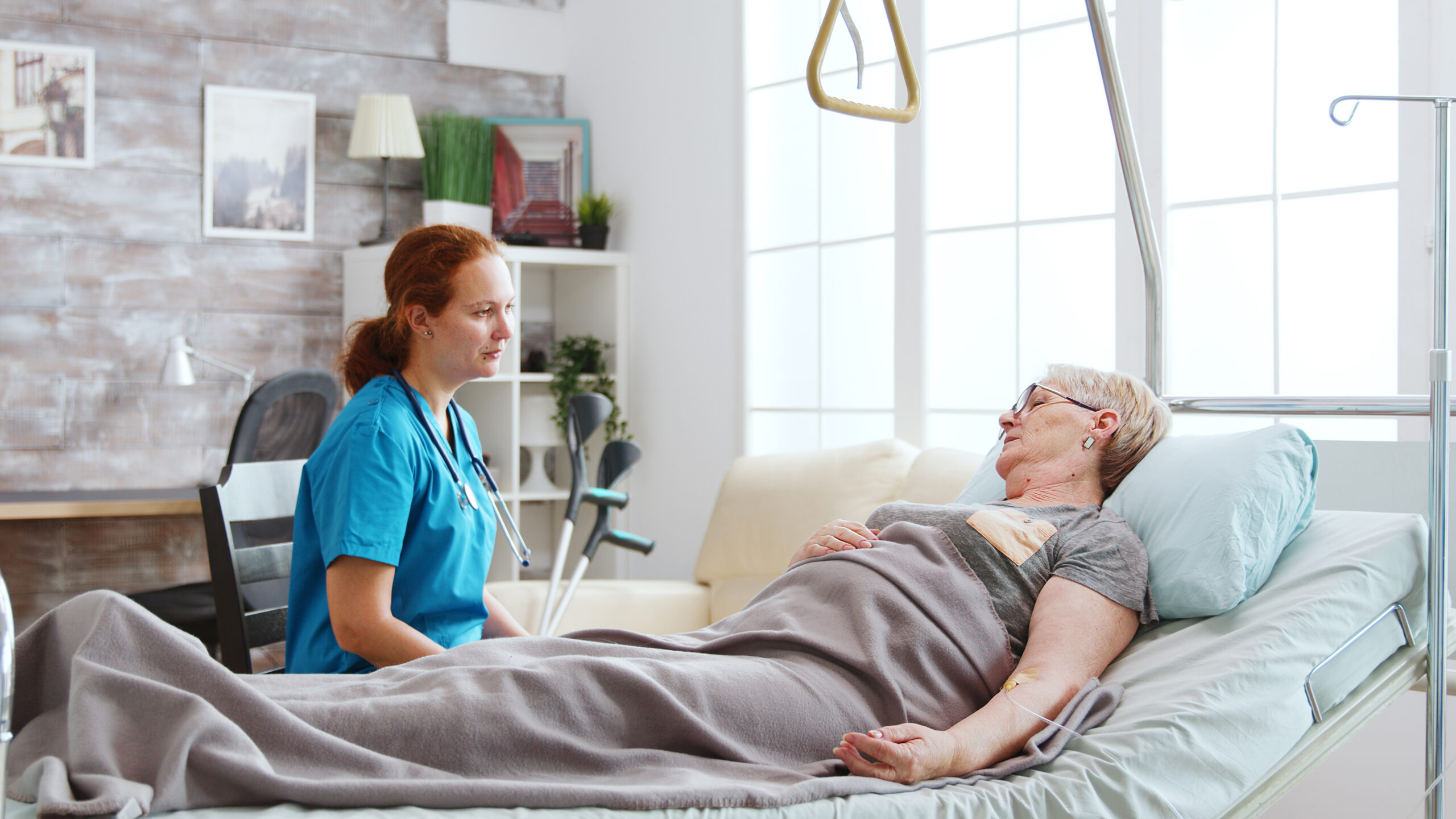There’s no place like home, especially when it comes to recovering from a hospital stay. However, the transition from hospital to home can be overwhelming, especially for aging adults. This period can be a delicate and vulnerable time for your health. That said, there are 5 things you can do to make the transition from hospital to home as smooth as possible. Each transition can be an open door for things to fall through the cracks and your treatment plan is passed on from one healthcare team to another.
A trip to the hospital can be scary and stressful, but coming home can be equally daunting for many people, especially older adults. Once you’re ready to leave the hospital, you might feel relieved to be going home, but it can also be overwhelming, confusing, and even lonely. You may need to adapt to new routines, medications, or medical equipment. The good news is that with a little preparation and support, you can make it a smooth transition from the hospital to home.
At some point in our lives, we may be faced with the need to be hospitalized. This can happen for any number of reasons, from an acute illness to an injury. No matter the cause, leaving the hospital and returning home can be a vulnerable time. Not only are you still healing, but you also have to navigate the healthcare system and ensure that you have all the resources you need to continue your recovery at home. As an aging adult, this transition can be especially challenging. That’s why it’s important to know what to expect and how to prepare. In this blog post, we’ll cover five things you need to know to make a smooth transition from the hospital to home.

1.Create a Discharge Plan:
A discharge plan is a written plan of instruction that outlines your care needs after leaving the hospital. It includes information about your medications, treatments, and follow-up appointments. Your healthcare team should create a discharge plan with you before you leave the hospital. Make sure you understand and have a copy of the plan. Review it with your caregiver, family members, and any healthcare providers involved in your care. It is so important for you to identify a friend or family member to be a “care partner or support person.” Someone other than you should also receive the instructions for your discharge. At the time of discharge, you might be anxious about getting home and it is nice to have someone else also hear the instructions to help support you in remembering and following up on your treatment plan. Be sure you can speak back in your own words to demonstrate your understanding of your treatment plan, it not ask more questions.
One of the most important things you can do before leaving the hospital is to talk to your doctor. Make sure you understand your diagnosis, treatment plan, and any follow-up appointments. Ask about any new medications or prescriptions, and make sure you know how to take them correctly. Your doctor may also need to arrange and give “orders” for in-home care or any other special needs or equipment you may have. If your diagnosis is overwhelming to you and there are a lot of moving pieces, ask if the social worker or case manager can arrange for a care conference in your room prior to discharge. This way you can speak with the entire care team before you go home and get all your questions answered.
Before you leave the hospital, make sure you know what medications you need to take and when. Understand the purpose of each medication, any possible side effects or drug interactions, and make sure you have enough medication to last until a pharmacy can fill a prescription. Always ensure you keep a current list of medications that can come in handy in emergency situations. Ask to see the pharmacist to discuss any questions regarding changes or new medications.
If you need to pick up a prescription, ask someone to do it for you or use a pharmacy delivery service. It is ideal to have your prescriptions filled the day you go home and best before you leave although this is not always possible. If you are discharging in the evening or a holiday, make sure you will be able to get your medications before you go home. Some pharmacies may be closed. Be sure you are aware of any co-pays you may have that may lead to any problems paying for your medications. Have your prescriptions filled at the same pharmacy to prevent potential drug interactions. If you are a Vet and get your prescriptions at your local VA you will need to determine if you need a small supply of new medications at a local pharmacy especially if you receive mail-order service from the VA.

2. Get Help at Home
Prepare your home. Ensure that your home is safe and easy to access on your return. If necessary, enlist the help of a family member or friend to help move things around. Remove tripping hazards and secure rugs and carpets so that they do not slip, making it easier for you to move around the house. Ensure that you have extended handrails in the bathroom and night lights in your home to help you navigate at night more safely. If you have stairs, consider moving to a temporary bedroom on the first floor. If you are unsure about what changes are necessary, ask your healthcare team for guidance.
Home health services may be in order to assist in your recovery. Skilled care such as physical, occupational, speech therapy, a nurse and even a nursing assistance may be necessary to further your recovery. You may not be feeling back to normal when you leave the hospital, so you may need some extra services to help you complete your recovery. Ask your social worker or case manager to see if you may qualify for these services prior to you going home.
Supportive home services could include assistance with personal care, meal preparation, or medication management. Having some extra help at home can make a huge difference in your recovery and well-being. Make sure to discuss this with your social worker or case manager before leaving the hospital so this can be arranged and ready for you when you go home.
3. Follow Up with Your Healthcare Team
After leaving the hospital, it’s essential to keep in touch with your healthcare team. You will have a follow up doctor appointment scheduled before you go home. This is one place where a mistake can occur. If you discharge home on a holiday or weekend, most clinics are closed and so your appointment may not get scheduled until the working day. Make sure your appointment gets scheduled. It is so important to follow up with your doctor within days or a week or two depending on why you were in the hospital. You need to make sure you are continuing to progress and get well. You may also need a specialist appointment made. Make sure you take a copy of your discharge instructions with you and write down any questions before your appointment.
Be sure to schedule regular appointments with your doctor, whether virtual or in-person, after your release from the hospital. This measure allows your healthcare professional to monitor your condition to ensure that your care plan remains effective and work with them to address possible health problems that may arise in the recovery process.
Stay connected with your doctor and be aware of whom to contact if your symptoms worsen. Make sure you have a phone number for your primary care physician, surgeon, and any specialist you may be seeing. You may need to call them when you have concerns or have a question about your medication. Keep a close eye on any changes to your body, such as fever, wound drainage, shortness of breath (especially if you have been diagnosed with a respiratory illness), or if you are experiencing any new symptoms.
4. Be Prepared for the Unexpected
Recovering from an illness or injury is not always a straightforward process. There may be setbacks or unexpected complications along the way. To be prepared, have a plan in place for what to do if you experience any new or worsening symptoms. Make sure you have a list of emergency phone numbers, including your doctor, hospital, and other healthcare providers. As nurse advocates, we always encourage our clients to have a “go folder” with all the necessary copies of documents to make sure your treatment plan is communicated to your entire team as needed.
Understand your physical limitations and become mindful of what you can and can’t do while recovering from a hospital stay. Trying to overexert yourself too soon can delay your recovery. Make sure to follow your healthcare provider’s instructions on physical activity and rest. Make sure you are aware of any lifting or weight bearing restrictions and for how long.
Keep an eye on your symptoms and report any changes to your healthcare provider. Follow up with any scheduled appointments, such as rehab sessions or doctor visits. Keep track of your vital signs, such as blood pressure and temperature. If you experience any concerning symptoms, such as chest pain or difficulty breathing, call 911 or go to the emergency room. If you are suppose to track or log any health information after you leave the hospital, make sure you bring it with you to your doctor’s appointment.
5. Consider Hiring a Nurse Advocate
Navigating the healthcare system can be overwhelming, especially when you are already dealing with the stress of an illness or injury. A nurse advocate can help you make sense of your medical care, coordinate with your healthcare team, and ensure you have all the support you need at home. A nurse advocate can also advocate for you if you have concerns about your care or treatment plan.
One of the best things you can do when coming home from the hospital is to talk to a nurse advocate. They can provide you with comprehensive knowledge and insights into what type of care you require after being discharged. They can also advocate for you to ensure that all your bases are covered and that everyone involved in your healthcare is on the same page.

Conclusion:
Leaving the hospital after a serious health issue is a moment of great relief. But to ensure a smooth recovery, it’s essential to prepare for a seamless transition from hospital to home. Coming home from the hospital can be overwhelming, but with proper preparation and care, it doesn’t have to be. By understanding your medications, setting up assistance, scheduling regular doctor visits, knowing your limitations, and seeking the help of a nurse advocate, you can begin your recovery on the right foot, and increase the chances of a successful return home.
We hope that the five steps outlined in this post will help make the process smoother, avoid errors in your treatment plan, and that you can use them to return home confidently and safely. Having a support system in place and understanding your condition will lessen your concerns and stresses, making your homecoming as smooth and comfortable as possible. With a little preparation and help from a nurse advocate, returning home can mean the start of a new beginning of wellness and a healthier lifestyle for you.
Thanks for stopping by and spending a few minutes here. Please reach out with any questions and check out our list of resources for more helpful information.
Take care and until next time,
Pam and Linda
Your Nurse Advocates
Resources
Private Forum Speaking out on the Care of Aging Parents
Free Checklist Signs Your Aging Parent May Need Help in the Home
Beginner’s Course to Step in and Begin to Manage the Care of Your Aging Parents
Free Senior Saturday Weekly Newsletter
Your Nurse Advocate Consulting YouTube channel.
https://www.nia.nih.gov/health/how-prepare-doctors-appointment
https://www.nia.nih.gov/health/how-prepare-doctors-appointment#list
https://www.nia.nih.gov/health/talking-with-doctor-worksheets






